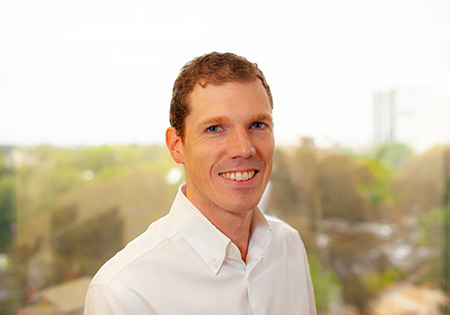On the lighter side of things, we ask James Thorley, Regional Vice President – APAC, Turnitin, what makes him tick.
What would you describe as your most memorable experience?
I hope it’s still to come! But, to date, I’m most proud of the fact that I’ve been able to pull together a fantastic team here in Melbourne. I was employee number eight at Turnitin in the UK in 2005 and the company had a terrific, family-like culture. Ten years later, I was persuaded to move to Australia to spearhead our expansion in Asia Pacific. Going back to that start-up environment, becoming the face of Turnitin in the region and taking responsibility for growing the business here has been incredibly rewarding.

What first made you think of a career in technology?
The short answer is ‘nothing’ because I wasn’t thinking of a career in technology! I was planning a career in education. My ambition was to get a job teaching English in Japan and while I waited for that to come up, I applied for a stopgap gig with a small EdTech company. Sixteen years later, I’m still here! One of the reasons I’m still here at Turnitin is because I’ve seen the positive impact technology has on education and it’s exciting to be a part of that. Working in ICT has also given me lots of opportunities to travel. Before moving to Australia, I oversaw Turnitin’s business in Africa, South America and Asia.
What style of management philosophy do you employ with your current position?
I heard something on a podcast recently which I’ve adopted as my management mantra. It’s called 25-50-25. The idea is that, as a leader, you spend 25% of your time managing your team, 50% working with them as a peer – brainstorming, strategising and so on – and the other 25% working for them, by removing roadblocks and solving problems. As someone who’s always had a fairly hands-off style, it really resonated with me. I certainly also do not like to tell people how to manage their own areas of expertise. I subscribe to the idea of hiring people with complementary skills and who can do things better than you can in those areas.
What do you think is the current hot technology talking point?
AI is definitely the biggest thing in technology at the moment, across a lot of different verticals, including education. For good, and for bad, it’s going to be a massive disruptor and have a huge impact on the future of work. It will allow us to do things human beings would never otherwise have the time to do. In the education sphere, I see it being used to provide timely insights and feedback, to students and educators, in ways that could transform the learning process.
How do you deal with stress and unwind outside the office?
Fortunately, I don’t get stressed too easily. My baseline is quite relaxed, more so since I moved to Australia. I aim to put issues in context and look for solutions, rather than becoming anxious about them. Family is a big help when it comes to switching off at the end of the week. I have a young child and kids don’t care what kind of day you’ve had, they’re just really happy to see you. That brings me out of the work bubble. So does cricket. Shortly after moving here I joined a club – being 190cm, I found my usual spot in the bowling line-up! – and out on the field I’m definitely not thinking about work.
If you could go back and change one career decision, what would it be?
I wouldn’t change any of the career decisions I’ve made, but I did learn a good lesson before I joined Turnitin. The Japanese government recruits English teachers from abroad each year and being accepted on that program is considered to be the best opportunity of its kind you can have. I got an interview and, long story short, didn’t invest enough time in preparation and blew it. In my head I was a great candidate and missing out was a real blow. That experience taught me that if something is really important to you, then it pays to over-prepare.
What do you currently identify as the major areas of investment in your industry?
In the EdTech sphere, AI and data analytics are big. Universities are aware there’s the potential to gain insight into everything from what influences students to drop out, to how alternative teaching methods can be used to boost engagement and grades. It’s become more of a thing since institutions pivoted to online learning. Information that was once temporal – when students show up for class and how long they spend engaging with materials, say – is now being captured digitally.
What are the region specific challenges when implementing new technology in APAC?
In some countries it’s infrastructure and bandwidth but the common challenges across the region are change management and digital capability. A lot of Turnitin customers worry about whether their people will be willing and able to get full value from our solutions. That may be particular to the education sector though. Academics, particularly older ones, aren’t always big technology users and doing things differently can make them uncomfortable.
What changes to your job role have you seen in the last year and how do you see these developing in the next 12 months?
In January 2020, I was promoted to regional Vice President for APAC and the size of my team increased from 30 to 90 people. Last year I was focused on creating structures and processes to support that expansion. The other thing is that, although we’ve all been grounded, my focus has broadened – I’m much more spread out across the region mentally. As borders open up this year – hopefully! – I expect to start traveling again, albeit not as much as I did in 2019, when I spent three months on the road.
What advice would you offer somebody aspiring to obtain a C-level position in your industry?
You have to understand the basics – how people on the first rung do their job. A lot of people are so focused on getting into management, they don’t want to get their hands dirty but nothing beats knowing how to do the work. It’s also important not to impose an artificial ceiling on yourself, in terms of what you may be able to achieve. That doesn’t mean being over-confident or arrogant; it’s more about backing yourself and tackling the challenges optimistically. Think about what you’re capable of and what you can do to get where you want to go.
The next big shift in management is understanding that you should be looking to hire and manage people who are better than you and not to be scared of that. Mentally, focus on your strength and the reason why you got into this role in the first place and not try to be brilliant in everything as that is not the point of management. Look for opportunities that will enable you to advance and do not expect to stay in the same place. Weigh up what is most important to you.


